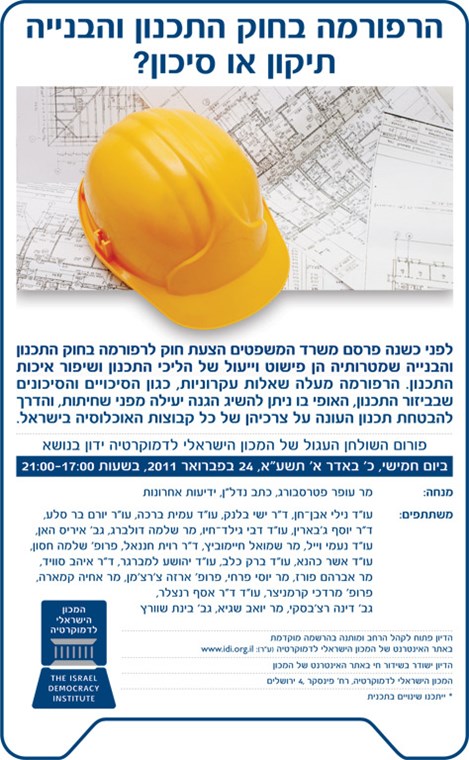Roundtable: Reforming the Israeli Planning and Building Law
The Israel Democracy Institute | 4 Pinsker Street, Jerusalem
In 2010, the Justice Department published a memorandum of a new planning and building bill that would replace Israel's Planning and Building Law of 5725-1965, which monitors and regulates all building and designation of land use in Israel.
According to the initiators of this reform, the new bill is intended to simplify, streamline, and shorten the planning process, while at the same time improving the quality of planning and of its implementation. Among its proposals, the memorandum includes the following:
- The transfer of most of the authority for detailed planning to local committees that will be authorized to deal with such matters
- The principle of "one plan; one planning agency"
- Significant procedural changes in the process of submitting a plan, subjecting it to public inspection and opposition, and obtaining final approval.
The new bill has been sharply criticized by a variety of organizations, which have argued,inter alia, that the proposed legislation damages the mechanisms for control and supervision in the planning system; that it makes the system more vulnerable to corruption; that it strengthens the political operators within the planning bodies, at the expense of professional representatives and representatives of the public, that it deepens the gaps between the different local authorities and between the center and the periphery; and that it does not establish sufficient mechanisms for involving the public in the planning process.
The proposed reform raises a number of important and basic questions that warrant in-depth and serious public debate. These include:
- How can the effectiveness of the planning system be enhanced while at the same time maintaining mechanisms for balance and control?
- How centralized should the system be? What are the potential benefits and risks involved in decentralizing the authority for planning issues and enhancing the power of the local authorities?
- In what should the planning system be protected against corruption, systematically and structurally?
- How can we ensure that planning in Israel will meet the needs of all population groups in a manner that is equitable?
- What is the best way to advance the improvement of the planning system in Israel?
On February 24, 2011, IDI convened its George Shultz Roundtable Forum to discuss the aforementioned questions. The panel included both supporters and opponents of the new law, in order to present as balanced a picture of the proposed reform as possible.
- Adv. Yoram Bar-Sela, Legal Advisor The Israel Antiquities Authority
- Adv. Eli Ben Ari, Legal Advisor of Israel Union for Environmental Defense
- Dr. Yishai Blank, Chair, Bimkom - Planners for Planning Rights
- Prof. Arza Churchman, Dean, Faculty of Architecture and Town Planning, The Technion
- Mr. Shlomo Dolberg, Union of Local Authorities in Israel
- Adv. Nili Even-Hen, The Movement for Quality Government
- Mr. Yossi Farhi, Architect
- Professor Eran Feitelson, Associate Professor of Geography and Public Policy
- Adv. Debbie Gild-Hayo, The Association for Civil Rights in Israel
- Mr. Samuel Haimovich, Commission for Equal Rights of People with Disabilities
- Ms. Iris Han, The Society for the Protection of Nature in Israel
- Dr. Ravit Hananel, Tel Aviv University
- Prof. Shlomo Hasson, the Hebrew University of Jerusalem
- Dr. Yousef Jabareen, Faculty of Architecture and Town Planning, the Technion; The Arab Center for Law and Policy
- Adv. Asher Kahana, Legal Advisor, The Israel Planners Association
- Adv. Barak Kalev, Attorney, Orna Lin & Co.
- Mr. Achiya Kamara, Commissioner of Equal Rights for People with Disabilities
- Professor Mordechai Kremnitzer, VP of Research, Israel Democracy Institute
- Adv. Yehoshua Lemberger, Deputy State Attorney
- Adv. Avraham Poraz, Advocate and Former MK
- Ms. Dina Rachevsky, Architect, Former Head of the Planning Division, Ministry of the Interior
- Adv. Dr. Asaf Rentsler, Partner, S. Horowitz & Co., Expert on Land Use Law
- Mr. Yoav Sagi, Founder and Director, the Open Landscape Institute (OLI)
- Dr. Ihab Suede, The Arab Center for Alternative Planning

- Tags:
- Transparency
